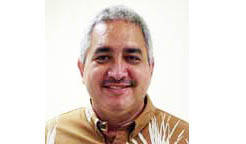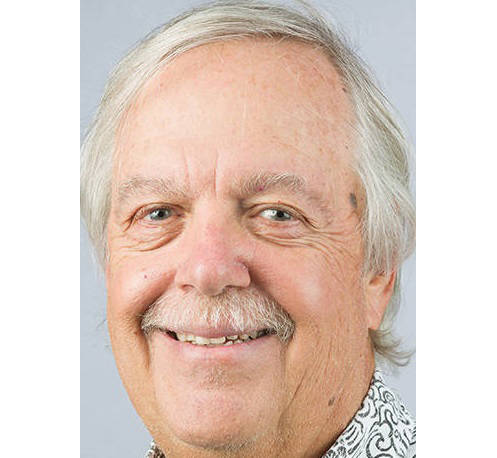CORRECTIONS: A previous version of this story incorrectly stated Sue Lee Loy is a freshman councilwoman. She is nearing the end of her second term on the County Council. Also Jeffrey Hawk is a District Court Judge, not a per diem judge, as was gleaned from an incorrect press release from Gov. David Ige’s office on candidates for a circuit court appointment. The Tribune-Herald regrets the errors.
A retired Hawaii Police Department detective has been charged with allegedly assaulting a county official while still a member of the department.
The felony information complaint filed Feb. 7 in Hilo Circuit Court charges Ian Lee Loy with second-degree assault, a Class C felony that carries a possible five-year prison sentence upon conviction.
Lee Loy is the husband of Hilo Councilwoman Sue Lee Loy, a two-term lawmaker running for re-election this year.
The complaint alleges that on July 25, 2019, Ian Lee Loy “did recklessly cause serious bodily injury to Neal Tanaka … .” Tanaka, according to the County of Hawaii website, is the acting deputy director of the Public Works Department’s Building Division.
Unlike an indictment, which requires the prosecutor’s evidence to be examined by a grand jury of ordinary citizens to support probable cause for the charge, or a preliminary hearing, which is conducted like a mini-trial before a judge in a public courtroom, an information charge allows prosecutors to go to a judge with their evidence and have the judge determine if probable cause exists.
It’s not known which judge signed off on the information charge, but a bench warrant setting Lee Loy’s bail at $1,000 and ordering him to stay away from Tanaka was signed by Judge Jeffrey Hawk.
Hawk is a District Court Judge in the 3rd Circuit who is on the Judicial Selection Commission’s short list of nominees forwarded to Gov. David Ige to replace Hilo Circuit Judge Greg Nakamura, who retired late last year.
The felony complaint lists Kauai County Prosecutor Justin Kollar and Kauai Deputy County Prosecutor Keola Siu as the attorneys of record for the state.
Hawaii County Prosecutor Mitch Roth “conflicted out” of Lee Loy’s assault case and previously declined to disclose to the two Big Island newspapers which law enforcement agency would prosecute the case.
A court document supporting the charge — which originally was sealed, but later unsealed Feb. 13 by Acting Hilo Circuit Judge Kanani Laubach — said police responded at about 2:32 p.m. July 25 to the report of an assault on a county employee at the Hilo Lagoon Center.
The document states Tanaka went to the Hilo Lagoon Center for a meeting and encountered Lee Loy in the walkway.
Tanaka reportedly told an officer that Lee Loy told him, “I told you to keep (it) above board!”
Lee Loy then, according to Tanaka, struck him on the right side of the face with an open left hand, causing pain to his right ear, according to the document. Tanaka told the officer he fell backwards, and Lee Loy told him, “There is so much more I wanna do to you,” before driving off in a silver Ford Exhibition sport-utility vehicle.
The document states Christopher Palacios, a certified physician assistant at Aloha Kona Urgent Care, documented “a perforation of Tanaka’s right tympanic membrane, resulting in rupture of about 1/4 (to) 1/3 of the ear drum.” Palacios further noted that “long term hearing impairment” could result from the injury.
The document states that at about 1:37 p.m. on July 25, police Capt. Reed Mahuna noticed a missed call on his cellphone from Sue Lee Loy. He then received two text messages from her, the first stating “please call me back,” and the second saying, “Ian punched someone I work with.”
Mahuna then called Sue Lee Loy who, according to the document, “told him her husband saw text messages that appear to show a relationship with this co-worker, but it is not true.”
Ian Lee Loy, 56, was arrested and booked Feb. 12 on the assault charge.
According to court records, the booking document was sealed, and Lee Loy’s name didn’t appear on the booking log that day or on any subsequent day since.
Jeff Portnoy, a Honolulu attorney who represents the Tribune-Herald and other news media outlets, said the sealing of Lee Loy’s booking documents and other documents in the case are “the way things are done in Third World countries where friends of important people manage to get embarrassing documents kept from the public.”
Portnoy said it’s “almost unheard of for a booking document to be sealed” and that an arrest is, by its very nature, a matter of public record “always, unless it’s a matter of national security, maybe, like you arrested a member of the Taliban or something. Or maybe the arrest of a drug dealer.
“But it’s very rare and only after a hearing. You’re talking about a police officer arrested for assault.”
Lee Loy, who is free on bail, was arraigned Feb. 13 before Laubach. Lee Loy pleaded not guilty and was ordered to appear for trial at 9 a.m. Aug. 3.
The Tribune-Herald could not immediately confirm which judge or judges ordered the sealing of either the document that Laubach later unsealed, or Lee Loy’s booking records, but Portnoy said any judge responsible for sealing the records “has completely violated the rules for trial court judges on when and how they can seal court documents and court proceedings.”
“I have told the Supreme Court repeatedly that it needs to better educate the judges of the law in the state of Hawaii as to the sealing of otherwise public proceedings and documents, particularly court proceedings and documents,” he said. “They are required to give notice. They are required to have a hearing. And they are required to make findings of facts and conclusions of law if they choose, after that hearing, to seal any portion of the hearing and the document.
“Secondly, the standard for sealing is extraordinarily difficult. There has to be some sort of overwhelming privacy interests — and what it appears we have here is nothing more than political connections.
“This is the kind of illegal, unconstitutional, preferential treatment that cannot be tolerated.”
Email John Burnett at jburnett@hawaiitribune-herald.com.











